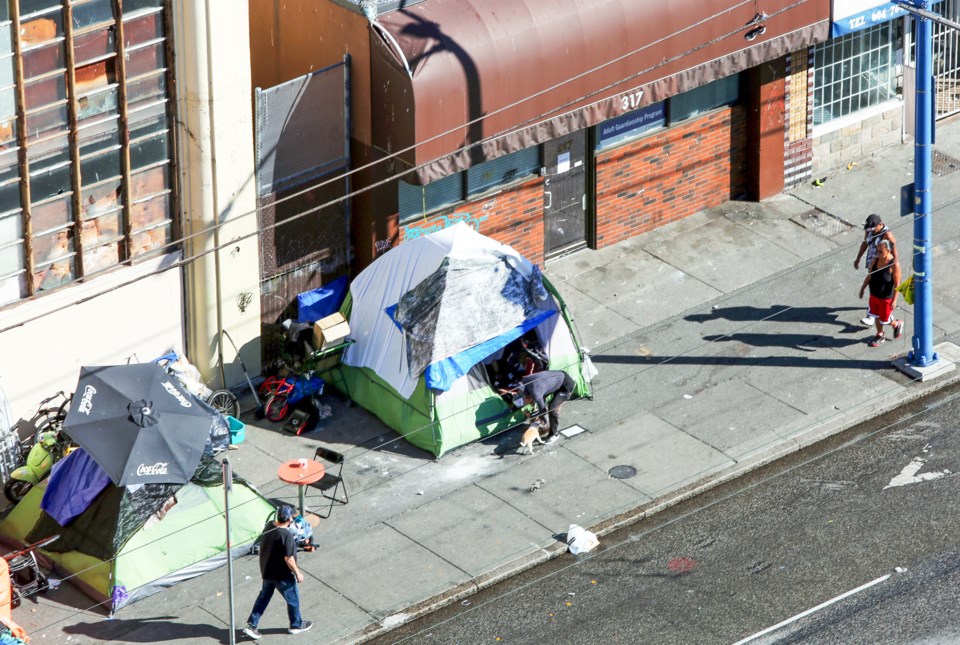B.C.’s Opposition United party continued to outflank the New Democrat government on the addictions crisis this week, releasing the first election promise for involuntary treatment and ratcheting up the pressure on the NDP to do the same.
United leader Kevin Falcon said he’d immediately introduce a legal change to the Mental Health Act to allow for longer periods of involuntary detainment and treatment for those suffering complex addictions and mental health crises who are repeatedly overdosing.
Currently, the narrow definition of self harm required for involuntary mental health treatment does not cover repeated drug use.
“There are people in the streets today, we've all seen them, that have severe untreated mental health and or addiction issues, that are not able or capable of making decisions in their own best interest,” Falcon said in an interview.
As a result, tragic scenes are playing out in downtown cores of many B.C. communities, in which people are splayed out in doorwalks and on sidewalks in drug-induced hazes, or suffering psychotic episodes.
“I think the right thing to do is recognize that a small cohort of population needs to be removed compassionately from the streets, involuntarily if necessary, and put into proper care for up to two years, where it's secure care where they can be stabilized, doctors and psychiatrists can work with them to deal with their alcohol or mental health issues,” said Falcon.
“And then at some point in the future release (them) back into the communities with appropriate supports.”
It can be done in a culturally sensitive way for Indigenous people, he said. And it should first focus on teens, so that parents have the power to compel them into addictions care, he said.
B.C. New Democrats considered a similar idea for teens in 2020 but then abandoned it out of fear of traumatizing children. Since then, there have been several stories of parents unable to force their teens into addiction care, who then fatally overdosed.
The government has a responsibility to intervene in cases where people — through drug use, mental health, brain damage, psychosis, addictions, or youth — aren’t able to make proper decisions about their own health care, said Falcon.
“If we don't do that, we're going to continue to see people die unnecessarily,” he said. BC Conservative leader John Rustad concurred when asked about the United plan this week.
It’s almost exactly what David Eby used to say when he was running for NDP leader in 2022.
“There are folks who will overdose two or three times in a day and end up in hospital, and it’s not until they profoundly injure their brains that the government says OK, we’ll care for you for the rest of your life,” Eby said at the time.
“I just feel like if you were harming yourself in any other way, our response would be different and we wouldn’t send you back out into the street to die,” he added.
“And that’s what we’re doing right now.”
But once Eby became premier, Indigenous leaders, civil liberties groups, the chief coroner, the provincial health officer, and others piled on criticism that forcing people to undergo addictions treatment was a violation of their rights and would backfire. Eby backed down.
He said he wouldn’t be comfortable until there’s enough addictions treatment spaces to first address long wait lists and delays for people trying to voluntarily access them.
Since then, his government has poured millions into a hodgepodge mix of treatment beds, scattered across the province, and created a seamless (but small) model of addictions care at St. Paul’s Hospital. Eby also hired an outside expert, Dr. Daniel Vigo, to give him advice on what to do about those who repeatedly overdose.
Put together, it’s an unimpressive and wholly inadequate response to the seriousness of the problem. But it is also, perhaps, just the bare minimum political cover the premier needs to say he’s laid the groundwork to give involuntary care another try.
There are no sure things in politics. But if you want to place an educated bet on where Eby is going with all this: put your money down on involuntary care making a return appearance in the BC NDP’s election platform.
Rob Shaw has spent more than 16 years covering B.C. politics, now reporting for CHEK News and writing for Glacier Media. He is the co-author of the national bestselling book A Matter of Confidence, host of the weekly podcast Political Capital, and a regular guest on CBC Radio.



